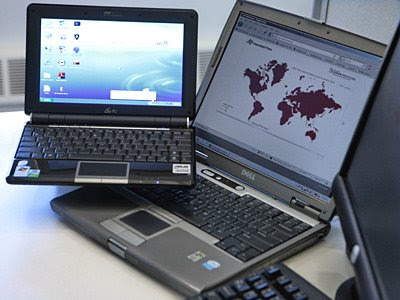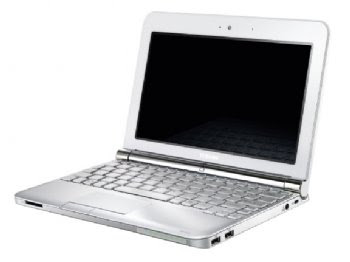Netbooks - The First Netbooks
Who invented the netbook? Mary Lou Jepsen. The first netbook was launched in 2007 by Asustek , they named it the Eee PC and 350,000 units were made. To everyone's surprise they sold out in a few months. The first netbooks were designed as a result of the "One laptop per child" initiative, largely based on the ideas of Mary Lou Jepsen, but the Eee Pcs were not bought by the people in poor countries for whom they were originally intended but by middle-class buyers in the West, who were looking for a second laptop computer they could carry with them and use for checking their email, YouTube or Facebook while they were on the move. The success of the Eee PC fnetbook orced major manufacturers such as Dell, HP, and Lenovo to take note. By autumn 2008, nearly every US notebook manufacturer had launched their $400 netbook.
Mary Lou Jepsen. The first netbook was launched in 2007 by Asustek , they named it the Eee PC and 350,000 units were made. To everyone's surprise they sold out in a few months. The first netbooks were designed as a result of the "One laptop per child" initiative, largely based on the ideas of Mary Lou Jepsen, but the Eee Pcs were not bought by the people in poor countries for whom they were originally intended but by middle-class buyers in the West, who were looking for a second laptop computer they could carry with them and use for checking their email, YouTube or Facebook while they were on the move. The success of the Eee PC fnetbook orced major manufacturers such as Dell, HP, and Lenovo to take note. By autumn 2008, nearly every US notebook manufacturer had launched their $400 netbook.(Asus Eee PC 1000HA Netbook)
 By the time 2008 was over, Asustek, which now makes some of the best netbooks under the name Asus, had sold over 5 million netbooks, and sales by other brands amounted to 10 million. One strange phenomenon is that Europe appears to have fallen in love with netbooks - sales are 8 times those in the US. In just one year, netbooks had rocketed to become 7% of the global notebook market. In 2009 it is expected to be 12%.
By the time 2008 was over, Asustek, which now makes some of the best netbooks under the name Asus, had sold over 5 million netbooks, and sales by other brands amounted to 10 million. One strange phenomenon is that Europe appears to have fallen in love with netbooks - sales are 8 times those in the US. In just one year, netbooks had rocketed to become 7% of the global notebook market. In 2009 it is expected to be 12%.Netbooks are the answer to what we actually do with our computers. People often buy the fastest most powerful computer available just in case, but in reality most people do very simple tasks on their computers, such as checking their email and surfing the net. Netbooks turned out to be the perfect solution.
Strangely enough netbooks have actually turned back the clock, whilst at the same time convincing people that they are the latest trendy thing. Netbooks perform like notebooks did 5 years ago, but it turns out that that is good enough.
Asustek realized that most people do a small range of things online over and over again and they could therefore produce a machine that would do those things for less than $300, but their netbooks are more or less useless when you are not online. They more or less force you to buy into the vaporous dream of cloud computing, because there's no storage space on your netbook.
When Asustek released their Eee netbook, the major companies like Dell
 , HP, and Apple didn't react Lillian Lin of Asustek said "All the other brands were thinking, 'Oh, this is crap,'"
, HP, and Apple didn't react Lillian Lin of Asustek said "All the other brands were thinking, 'Oh, this is crap,'"Why would Dell and HP want to sell a netbook for $400 when they were doing very well selling notebooks for $1,000? For Asustek and MSI things were different, they had no established PC business so they had nothing to lose.
(Dell Inspiron Netbook)
Netbooks are the classic example of an upstart upsetting the apple cart.
To get around the problem of not being able to use Photoshop on a netbook there are things like Fotoflexer online, a web-based editing application that is a good enough replacement for Photoshop.
Netbooks are now so cheap that companies like Vodafone and RadioShack are giving them away to people who sign up for their services.
Another strange netbook phenomenon is that they are so cheap that the makers barely make a profit on them. Paul Goldenberg, MD of Digital Gadgets says "The profit margins on these things are nonexistent. Everyone is saying 'We're losing money now, but we'll make it up on volume, right?'"
Netbooks have set the cat amongst the pigeons in more than one way. Microsoft had planned to stop selling Windows XP so that customers would have to buy the more lucrative Vista OS, but when Linux started to be installed in netbooks, Microsoft had to quickly change tack and extend the life of XP for another 2 years.
Microsof t say is making "good money" on netbooks but they charge only $15 for XP on netbooks, but plans to ensure that Windows 7 will run on netbooks — Vista is not good on netbooks. If you get Windows 7 make sure you choose Windows 7 Home Premium, the 'starter' version is not much good.
Intel is selling millions of Atom chips to netbook makers and says "We see this as our next billion-dollar market," even though they make only a fraction of what they make on a Celeron or Pentium in a laptop.
The great fear is that cheap netbooks are so good, people will not want to spend $1,000 for a laptop.
Times they are a changing however in laptop world and netbooks are set to take off in the USA like they have in Europe. But the next major market will be the BRIC countries (Brazil, Russia, China dn India) where there are billions of people who don't have any sort of computer yet amd for whom price is a major consideration.
Netbooks could in fact lead to even cheaper computers, that don't even need a motherboard. Mary Lou Jepsen says "if you want the batteries to last why not just make a screen and a really cheap $2 to $5 radio chip?" This seems to be the way things are going, everything, including games will be done online and people will look for the smallest computer they can get.
Home : Best Netbooks
Netbooks for Christmas - click here - Dell Nickelodeon Best Netbook for Kids
- Asus Disney Netpal Best Netbooks for Kids




